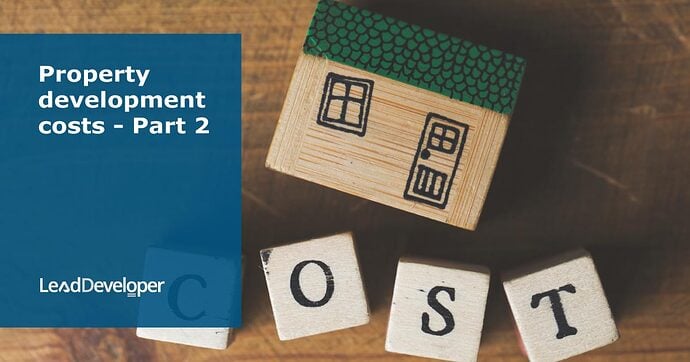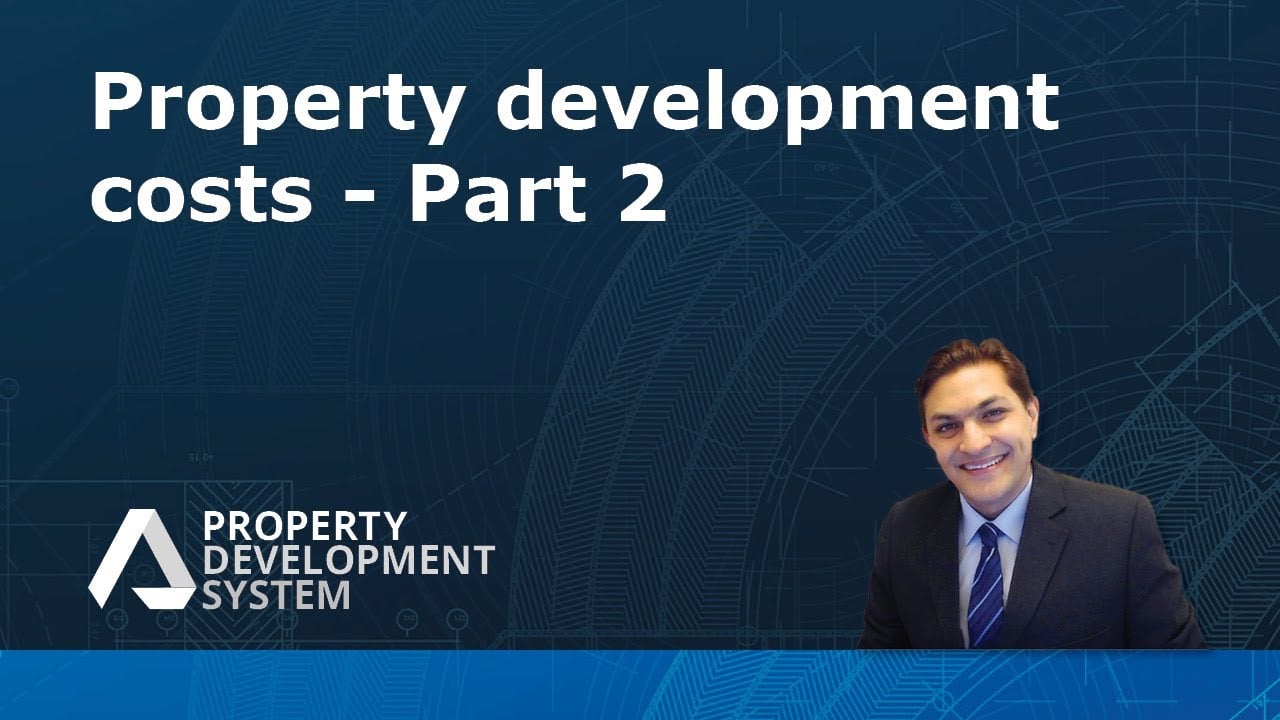Development Costs - Part 2
Here are various components of development costs in construction projects, emphasising the importance of thorough planning and budgeting for developers. Key points include:
Pre-construction
Includes site preparation costs like service abolishment (gas and electricity) and site cleaning. Demolition, site cuts, and cleaning to prepare a flat construction surface are also highlighted.
Construction stages
Detailed are the substructure (slab or base), superstructure (frame and lockup), finishing (fit-out and fixing), and practical completion (handover) stages, alongside costs associated with each.
External costs
Landscaping and land subdivision costs, including civil engineering fees to bring services to subdivided blocks, are discussed. The video also covers various contributions and charge fees, such as infrastructure levies and council contributions.
Selling and marketing costs
Focuses on advertising, sales commissions, 3D artist impressions, and legal fees related to sales and property management.
Landholding costs
Details ongoing costs during development, such as land tax and rates, and emphasises planning for interest costs, security, and insurance.
Resources
Suggests resources for cost estimation, including professional organizations and websites specific to different countries, underscoring the value of accurate cost estimation in development projects.
Frequently Asked Questions
How do pre-construction activities impact overall development costs?
Service Abolishment
Before construction begins, services like gas and electricity must be disconnected. While water typically remains connected, ensuring that gas and electricity are abolished is essential for demolishing existing structures safely.
Site Preparation
The site must be cleaned and prepared for construction. This involves demolishing any existing buildings, a process that incurs its own set of costs, including obtaining demolition permits and conducting site investigations.
Site Cut and Cleaning
Making the site flat and ready for construction is another critical pre-construction activity. This ensures that the builder has a level surface to start the construction, impacting the ease and speed of the subsequent building stages.
What are the key factors influencing the cost of construction stages from substructure to practical completion?
Substructure (Slab or Base Stage)
This initial phase involves laying the foundation of the construction. Costs here are influenced by the type of soil, the complexity of the foundation required, and any ground preparation needed.
Superstructure (Frame and Lockup)
The erection of the frame and the building’s outer shell or lockup involves significant materials and labor. The design complexity, materials used (e.g., steel vs. wood), and the building’s height can majorly impact costs.
Finishing (Fit-out and Fixing Stage)
This stage covers interior work, including plumbing, electrical, and finishing touches. The quality of materials, interior design complexity, and labor skills required are key cost factors.
Practical Completion (Handover)
The final touches before the building is considered complete for handover can also incur costs depending on the inspection requirements, finishing quality, and any last-minute adjustments needed
What are pre-construction costs in construction projects?
Pre-construction costs include expenses incurred before the actual construction begins. These typically involve site preparation tasks such as service abolishment (disconnecting gas and electricity), site cleaning, demolition, site cuts to create a level construction surface, and other preparatory work required to make the site ready for construction.
What are the stages of construction and their associated costs?
Construction stages can be broadly categorised into:
Substructure
This includes the construction of the slab or base of the building. Costs involve foundation work and any underground facilities.
Superstructure
This stage involves erecting the frame and lockup of the building, including the walls and roof, and securing the structure from external elements.
Finishing
Known as the fit-out and fixing stage, it covers internal construction like installing fixtures, painting, and finishing work.
Practical Completion
This is the handover stage, where the building is completed and ready for occupancy. Costs here are related to final inspections, corrections, and administrative tasks.
What are the external costs in construction projects?
External costs include expenses outside the direct construction activities, such as:
Landscaping
The cost of outdoor aesthetic and functional space planning.
Land Subdivision
Costs involved in dividing a larger land parcel into smaller lots, including civil engineering fees for extending services (water, electricity) to these lots.
Contributions and Fees
Charges by local councils or governments for infrastructure levies, council contributions, and other regulatory fees.
What costs are involved in selling and marketing construction projects?
Selling and marketing costs encompass all expenses related to promoting and finalising the sale of the project, including:
- Advertising and promotional materials.
- Sales commissions paid to real estate agents.
- 3D artist impressions for pre-sales marketing.
- Legal fees associated with sales contracts and property management.
What are landholding costs in construction projects?
Landholding costs refer to ongoing expenses during the development phase, such as:
- Land tax and rates paid to local authorities.
- Interest costs on loans used to finance the project.
- Security measures to protect the site.
- Insurance costs to cover various risks during development.
- Resources for Cost Estimation
What resources can help in estimating development costs accurately?
Accurate cost estimation can be supported by resources from professional organisations and country-specific websites offering tools, templates, and guidance on budget planning and cost control in construction projects. Leveraging these resources and consulting with experts are crucial for precise budgeting and financial planning.
Why is accurate cost estimation important in construction projects?
Accurate cost estimation is vital for financial planning and budget management in construction projects. It helps in understanding the financial implications at each development stage, preparing for external factors affecting costs, and mitigating risks associated with overspending and project delays. Precise estimations ensure that developers can allocate resources efficiently, adhere to budgets, and ultimately achieve profitability in their projects.
Test Your Knowledge
Multiple-Choice Questions on Development Costs in Construction Projects
1. Pre-construction costs include:
A. Land tax and rates
B. Sales commissions
C. Site preparation and cleaning
D. Advertising and marketing
2. Which of the following best describes the substructure stage of construction?
A. Installing fixtures and painting
B. Erecting the frame and securing the building
C. Construction of the slab or base of the building
D. Landscaping and outdoor planning
3. External costs in construction projects may include:
A. Interest costs and insurance
B. Sales commissions and legal fees
C. Landscaping and civil engineering fees for land subdivision
D. Cost of materials and labor for construction
4. Selling and marketing costs in construction projects can involve:
A. 3D artist impressions and legal fees
B. Land tax and security costs
C. Infrastructure levies and council contributions
D. Site demolition and cleaning
5. Ongoing landholding costs during development include:
A. Demolition and site preparation costs
B. Sales commissions and advertising
C. Land tax, rates, and interest costs
D. Civil engineering fees for service extension
6. What is emphasised as a crucial resource for accurate cost estimation in development projects?
A. Construction machinery and tools
B. Professional organizations and specific websites
C. In-house project management teams
D. Government subsidies and grants
7. The practical completion stage of construction is primarily associated with:
A. Final inspections and handover
B. Installation of fixtures and finishes
C. Site preparation and demolition
D. Land subdivision and civil engineering works
8. Why is accurate cost estimation emphasised for development projects?
A. To ensure projects are completed within a short time frame
B. To enhance the aesthetic appeal of the project
C. For precise budgeting and financial planning
D. To simplify the construction process
Answers:
- C. Site preparation and cleaning
- C. Construction of the slab or base of the building
- C. Landscaping and civil engineering fees for land subdivision
- A. 3D artist impressions and legal fees
- C. Land tax, rates, and interest costs
- B. Professional organisations and specific websites
- A. Final inspections and handover
- C. For precise budgeting and financial planning
Assignment
Understanding Development Costs in Construction Projects
Objectives:
This assignment aims to deepen your understanding of development costs associated with construction projects, emphasizing the importance of planning and budgeting. By completing this exercise, you will gain insight into pre-construction activities, construction stages, external costs, selling and marketing expenses, and landholding costs. Additionally, you will explore resources for cost estimation and understand the significance of accurate budgeting in construction projects
Instructions:
Complete each of the following tasks and questions. Use a combination of research, analysis, and critical thinking to answer them comprehensively. Where research is required, utilise resources from professional organisations, construction industry websites, and academic journals.
Pre-Construction Activities Analysis:
To Do
- Create a checklist of pre-construction activities, including service abolishment, site cleaning, and demolition. Estimate the potential costs associated with each activity for a hypothetical small residential building project.
- How do pre-construction activities impact the overall budget and timeline of a construction project?
Construction Stages Breakdown:
To Do
- Develop a detailed budget breakdown for each construction stage (substructure, superstructure, finishing, and practical completion) for the same hypothetical project. Include labor, materials, and any specific costs that might be unique to your chosen project type.
- Which stage of construction is typically the most expensive, and why?
External Costs Exploration:
To Do
- Research and list potential external costs a developer might face, including landscaping, land subdivision, and council contributions. Provide a brief explanation of each and its relevance to a construction project.
- How can developers minimise external costs without compromising on the quality and compliance of the project?
Selling and Marketing Strategy:
To Do
- Design a selling and marketing plan for your hypothetical project, specifying budgets for advertising, sales commissions, 3D artist impressions, and legal fees. Justify your budget allocation.
- What strategies can be employed to maximise the impact of selling and marketing costs on project sales?
Landholding Costs Calculation:
To Do
- Calculate ongoing landholding costs, including land tax, rates, and interest costs, for the duration of your project. Discuss strategies to manage these costs effectively.
- Why is it important for developers to plan for landholding costs, and how can these affect the project’s profitability?
Cost Estimation Resources:
Research Task
- Identify at least three professional organizations or websites that provide resources for cost estimation in construction. Evaluate the usefulness of these resources in assisting with budget planning for your hypothetical project.
- How do accurate cost estimations benefit a construction project, and what are the consequences of underestimating costs?
Deliverables:
- Complete all tasks and answer all questions in a written report.
- Your report should include references to any resources, articles, or tools used in your research.
- Provide detailed explanations, calculations, and justifications for your answers and budget estimations.
Submission Guidelines:
- Submit your report in PDF format.
- Ensure your report is well-organized, with a clear structure and headings for each section.
- Your report should be between 1500 and 2000 words



